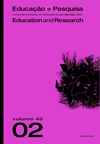Productivism, research and scholarly communication: between poison and medicine
DOI:
https://doi.org/10.1590/S1517-97022014061843Abstract
This essay addresses issues related to contemporary scholarly production and publishing. The analyses focus on the reflections of a perverse process which has affected researchers, universities and journals in Brazil (as it has occurred in different parts of the world), due to the so-called academic productivism (understood as the obligation to publish in journals, as virtually the only indicator used to evaluate researchers' scientific production and quality). Analyses also focus on the negative consequences of such process. Assuming that it is not possible to address the issue of scientific communication separately from the structure of scientific production, since the universe of indexed journals is part of the latter, this essay seeks to discuss the following questions: what are the main distortions that adopting largely quantitative criteria to assess, promote and fund researchers, journals and graduate programs has caused? What are the characteristics of the perverse cycle of productivism which now infects our academic context? How does such cycle affect our production and publications? How does what was planned to improve the investigative task end up damaging it? Although I do not, of course, aim to exhaust the complexity of this process, I shall discuss some features identified in the mechanisms above. I shall also present some arguments in favor of collective action among editors of scientific journals (especially in the humanities), in order to develop political action to combat the ills of the current system of production, evaluation and communication of science.Downloads
Download data is not yet available.
Downloads
Published
2014-06-01
Issue
Section
Articles
License
Authors assume exclusive responsibility for the concepts expressed in their articles, which do not necessarily reflect the journal’s opinion.
Permission to photocopy all or part of the material published in the journal is granted provided that the original source of publication be assigned.
How to Cite
Productivism, research and scholarly communication: between poison and medicine . (2014). Educação E Pesquisa, 40(2), 325-346. https://doi.org/10.1590/S1517-97022014061843



